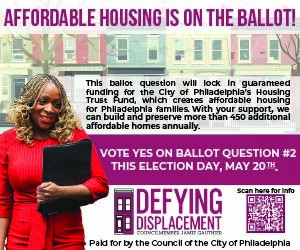The West Philadelphia neighborhoods of Mantua, Mill Creek, Powelton Village, Belmont and Parkside have never been short on hope, dreams and promise. But they have often been short on funding.
That will very likely change now that these areas have been declared a federally designated “promise zone,” which makes them more likely to get future federal funding. About half of the zone’s approximately 35,000 residents live in poverty. The zone runs from Girard Avenue south to Sansom Street and 48th Street east to the Schuylkill River.
Here are some reactions on Twitter to the announcement last week:
We’ve always believed that our community had #promise! Excited for the potential the #promisezone funds will bring! http://t.co/UaMxXLDRAz
— PEC (@PECCaresPhilly) January 10, 2014
Pres @BarackObama at the #PromiseZone designation announcement. Phila is proud to receive this award. pic.twitter.com/pZBnL7DvFm — Michael A. Nutter (@Michael_Nutter) January 9, 2014
Hope the #promisezone activities in #phl include voter education. Voting -> Power -> Economic Power http://t.co/SO3rR1gSGn — Stephanie Singer (@sfsinger) January 10, 2014
Obama Designates Philadelphia as A Promise Zone, Drexel Will Play a Key Role in the Education Effort http://t.co/gGoKTOLhYV #Drexel
— Drexel U. News (@DrexelNews) January 10, 2014
The Philadelphia Inquirer‘s Jeff Gammage wrote a lengthy story published today that includes reactions from many of the players involved. They include grassroots organizations like the Mantua Civic Association and major nearby institutions like Drexel University. Wilford Shamlin III has a story in today’s Philadelphia Tribune on Drexel’s work with schools in the area.
The key strategies in the area include (from the White House website):
- Putting people back to work through skills training and adult education; classes on small business development to support entrepreneurs; loans and technical assistance for small resident-owned businesses; and the development of a supermarket providing both jobs and access to healthy food.
- Improving high-quality education to prepare children for careers, in partnership with Drexel University and the William Penn Foundation, through increasing data-driven instruction that informs teacher professional development; developing school cultures that are conducive to teaching and learning; mentoring middle and high school youth with focus on college access and readiness; and increasing parent engagement.
- Preventing and reducing crime in order to attract new residents and long-term investments, through strategies such as focused deterrence, hot spots policing, and foot patrol.
These neighborhoods have heard “promises” before. University City High School, for example, was renamed “University City Promise Academy” during the 2010-2011 school year. Two years later it was closed. So as the dust settles from the announcement we look forward to bringing you future posts on actual projects and how to get involved with them.








January 13th, 2014 at 3:25 pm
WE ALL KNOW WHAT THIS MEANS ”TIME TO MOVE THE BLACKS OUT”
January 13th, 2014 at 4:02 pm
Well I, for one, think you look fetching in that tin foil hat.
January 16th, 2014 at 5:46 pm
CHeck your privilege!
January 16th, 2014 at 8:18 pm
Do you mean the kind of privilege that allows a person to assume that someone else has (unspecified, unquantified) privilege, despite knowing literally nothing about that person? That kind of privilege?
January 13th, 2014 at 7:01 pm
Congratulations to the nonprofits who get to soak up the $!
January 13th, 2014 at 9:51 pm
a honest question—–where has any similiar program had 50%, even 30% of its “goals” met? I fully accept that the forces in power are real and have real negative effects, but where has easy money actually helped change the status quo? Real change and not just a new coat of paint on rotting wood.
January 19th, 2014 at 6:09 pm
The only actual solution to this is to raze the entire area and turn it into an urban prairie, a la parts of Detroit, until real development comes and makes the area profitable. You’re not going to have progress in these areas with the current residents. This money only serves to be skimmed off by shady ‘nonprofits’, and the neighborhoods will not benefit.